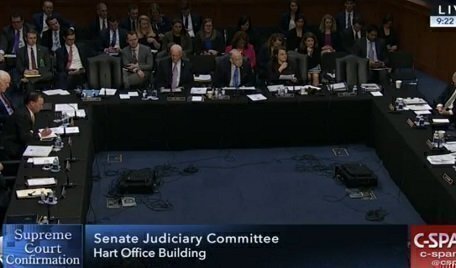As expected on Monday, a divided Senate Judiciary Committee has recommended to the full Senate that Neil Gorsuch be confirmed to the Supreme Court.
 After a period of contentious discussion, the committee voted 11-9 to send a report to the Senate recommending Gorsuch to replace the late Antonin Scalia on the Court.
After a period of contentious discussion, the committee voted 11-9 to send a report to the Senate recommending Gorsuch to replace the late Antonin Scalia on the Court.
Committee chair Chuck Grassley made it clear last week he wanted his committee’s report on Gorsuch's confirmation taken today, sending the nomination to Senate Majority Leader Mitch McConnell at the soonest possible time.
Democratic Senate Minority Leader Chuck Schumer has said he will filibuster the Gorsuch nomination, forcing the Republicans to get 60 votes in the Senate to break a cloture motion and move the confirmation to the full floor for 30 hours of debate.
Senate Majority Leader McConnell has indicated he will use a procedural move in the Senate to kill the filibuster process for Supreme Court nominees, leaving just one filibuster process in place for the Senate for legislative votes.
As of Monday afternoon, there was no indication that Republicans had the Senate votes to overcome the filibuster, as four key Democratic Senators have said they won’t vote to end the Schumer filibuster. There are 52 Republicans in the Senate and all are expected to vote to break the filibuster. So far, only three Democrats are expected to vote with the Republicans on the cloture vote.
The next steps in the filibuster drama will be the cloture vote in the full Senate, likely on Thursday. If the Republicans fail to get the 60 votes needed to override the filibuster, McConnell is expected to use the same procedure used by former Majority Leader Harry Reid in November 2013 to eliminate the Supreme Court nomination filibuster from the Senate rule books.






